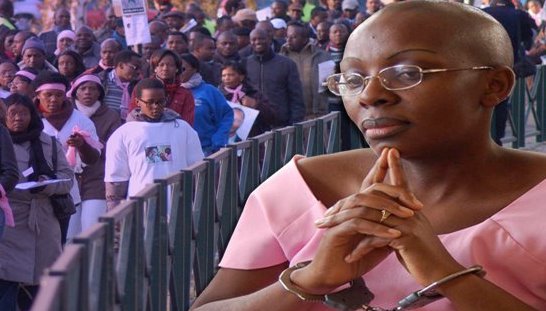Rwandan political prisoner Victoire Ingabire leads the FDU-Inkingi
PRESS RELEASE of the FDU-Inkingi Opposition Party of Rwanda and the Rwandan Diaspora
FDU-inkingi is extremely concerned by the news that three Rwandans—Gashabizi Emmanuel, Namuhoranye Pascal Bavugamenshi, and Bavugamenshi Gatanga—from Rusizi district, western province were picked by the Police on the 4th of June 2017, but cannot be traced by relatives in any police station in the district more than a week after their arrest. It calls on the Rwandan government to inform relatives of the whereabouts of their loved ones. As highlighted by Daniel Bekele, Africa director at Human Rights Watch: “enforced disappearances are a heinous crime, not least because of the anguish and suffering they cause to family and friends” adding that the anguish suffered by not knowing the fate of the disappeared person, ”amounts to inhumane and degrading treatment.”
We have learnt from reliable sources that on June 4, 2017, two policemen from Bugarama police station locally known as Kazungu and Gasasira Pierre, purporting to be acting on official instructions picked the following persons from their homes to unknown destination. They were picked up at around 2 PM. The people who were abducted include:
1. Gashabizi Emmanuel, Kiyovu: village Gakoni. Cell, muganza: sector, Rusizi District;
2. Namuhoranye Pascal Accountant at BugarmaHealth Centre ;
3. Bavugamenshi Gatanga village Gakoni cell muganza sector Rusizi district.
For the last one and half weeks. Relatives and friends have visited all the stations of Rusizi district and none of them has acknowledged their presence. The families are quite traumatised in view of the experience of police brutality in this region.
We would like to recall that on the 19th of August 2016, the National Police stated that it had killed three terrorists in sector of Bugarama, Rusizi district. It also announced that it had killed two other persons on the 20th of August 2016, suspected of being terrorists. The fight against terrorism has become a new credit card that the government has bought from the international coalition to fight against terrorism, in order to get rid of imaginary or real critics of the government.
Similar enforced disappearances have been reported in the capital Kigali in May and June this year and bodies of two of the victims were found dumped in Cyahafi, a suburb of the Kigali city.
Three months ago, a British citizen of Rwandan origin. Mrs Violette Uwamahoro was kidnapped and kept incommunicado for more than 2 weeks by security services. After denying knowing her whereabouts they confessed having her in their custody under the pressure of the British government. A sad realisation that countries that have adopted Rwandans are more concerned about their rights than the countries of birth.
FDU-Inkingi would like to recall that the Rwandan government is violating international and its own laws by kidnapping people.
Article 120, item 9 of the Rwandan Organic Law considers enforced disappearances as a crime against humanity adding that “any person who commits a crime against humanity provided under this item shall be liable to life imprisonment with special provisions.” It is also violating the” International Convention for the Protection of All Persons from Enforced Disappearance”. It states under article 5 which stipulates that “The widespread or systematic practice of enforced disappearance constitutes a crime against humanity as defined in applicable international law and shall attract the consequences provided for under such applicable international law.”
We call upon the Rwandan government to inform the families the whereabouts of their loved ones and to produce before courts of law if they have committed any crime and to bring to book perpetrators of the crime.
We ask the international community to end its silence over the crimes against humanity committed by the Rwandan government, particularly donors who, theoretically tell their people that their aid is tied to respect of human rights.
Done at London, June 14, 2017
For the FDU INKINGI
Justin Bahunga
Commissioner for External Relations and Spokespersons

